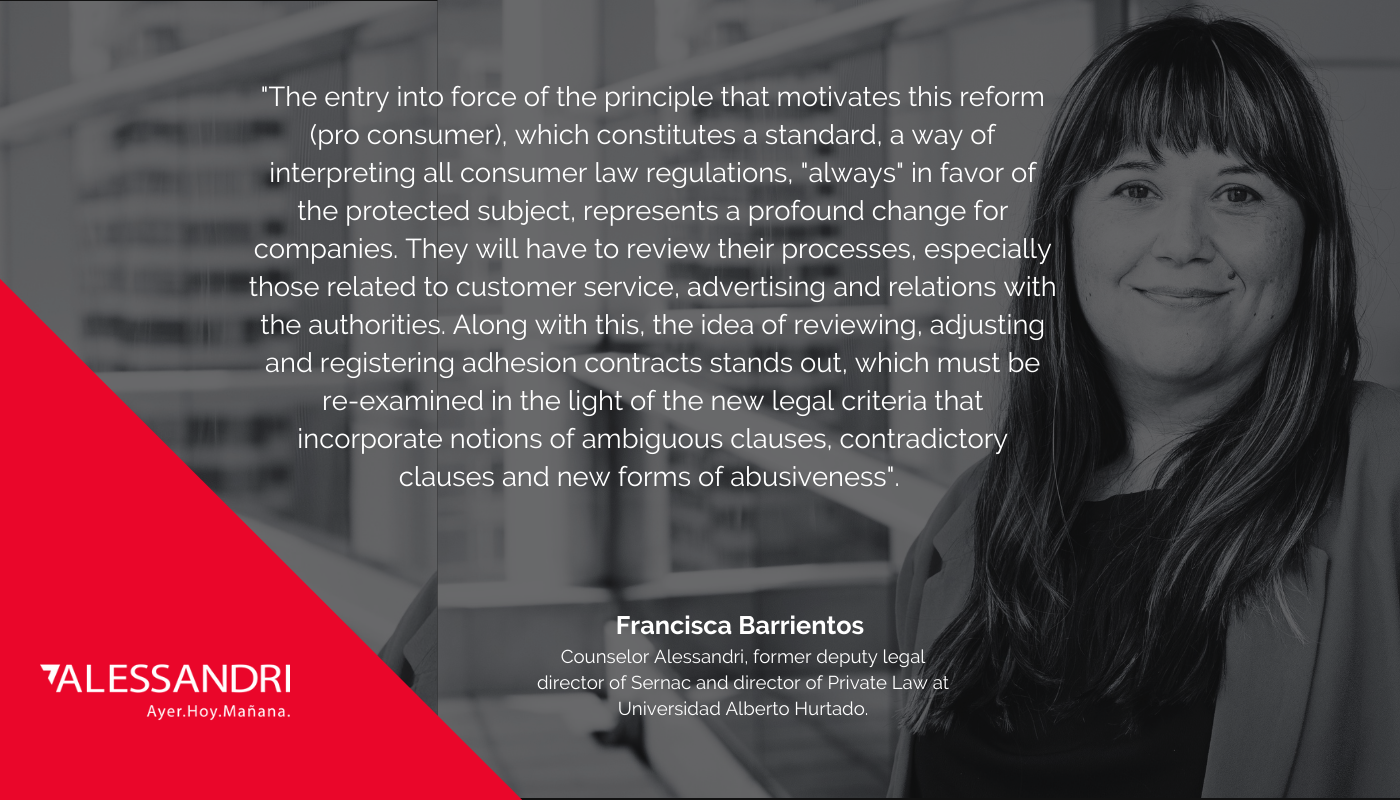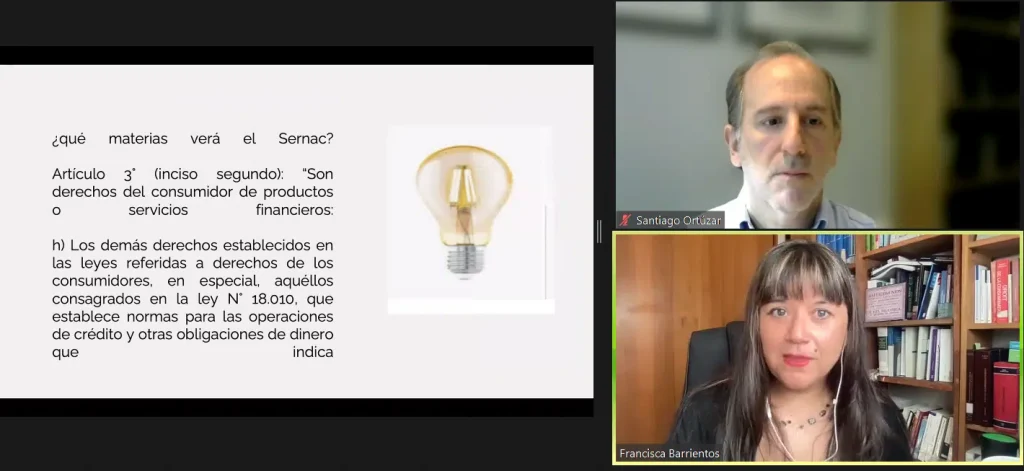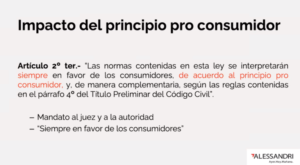/ Webinar: New Pro-Consumer Law, is your company prepared?
December 10, 2021The impact of the pro-consumer principle, the imminent modification of contracts, product dispatch deadlines, the modification to the legal warranty and financial rights, among other topics, were addressed in a webinar on the new law, just days before its enactment.
The pro-consumer law is a long-awaited reform. Just days before its enactment, Alessandri Abogados organized a virtual chat on the most relevant aspects of this legal amendment and how it will affect companies.

The meeting was moderated by Santiago Ortúzar, managing partner of the firm’s compliance area. Francisca Barrientos, expert in consumer law, counselor of Alessandri, former deputy legal director of Sernac and director of Private Law at Universidad Alberto Hurtado, was also present. In addition, Macarena Gatica, partner at Alessandri and expert in personal data, participated to deepen in some topics related to this area.
Santiago opened the webinar with an overview of the proposals on consumer issues of the two presidential candidates, Gabriel Boric and José Antonio Kast. Both programs propose to strengthen the powers of Sernac.

Francisca emphasized the high impact that the new law has on the processes of companies and many markets. “The reform of consumer rights translates into new duties for companies, and from the moment the law is enacted, these duties will be enforceable. All laws that in some way presuppose that there is a consumer-supplier relationship (…) will undoubtedly now be consumer issues”, explained the doctor of law.
Pro-consumer principle
 Regarding the pro-consumer principle, Francisca explained that the new Article 2 ter establishes a rule of interpretation, by virtue of which this law must always be interpreted in favor of consumers: “We must consider all possible cases of interpretation of the law and consider the principle. The invitation is for companies to review all processes directly and indirectly related (to the consumer) because this could be the first focus of the audit. This principle raises important challenges that are still unanswered. For example, how other public bodies such as the CMF will be organized”, explained Francisca.
Regarding the pro-consumer principle, Francisca explained that the new Article 2 ter establishes a rule of interpretation, by virtue of which this law must always be interpreted in favor of consumers: “We must consider all possible cases of interpretation of the law and consider the principle. The invitation is for companies to review all processes directly and indirectly related (to the consumer) because this could be the first focus of the audit. This principle raises important challenges that are still unanswered. For example, how other public bodies such as the CMF will be organized”, explained Francisca.
E-commerce
Francisca recalled that we have experienced an exponential boom in e-commerce due to the pandemic and there is currently an e-commerce regulation from the Ministry of Economy. “Apart from the regulation, we have to consider the new rule, which has to do with delivery”, highlighted the counselor. The reform points out that the company has to specify to the client the total cost and period of time the service will take.
“When the reform comes into force, it will be necessary to inform how long the producer’s delivery will take and this requires a different management model, new processes and internal coordination for an adequate delivery in accordance with the law. We have to be prepared,” Francisca added.
Contracts
Another important aspect of the law is related to contracts. There are three new obligations under the new law: to review them, adjust them (to bring them into line with current standards) and register them. “An effort must be made to look for ambiguous clauses, because these will be interpreted in favor of the consumer. It is also important to review possible abusive clauses, which will be removed from the contract and will be null and void.”
In relation to contracts adjustment, there will be a new guideline that will require a contract to be accessible to people with visual and/or hearing disabilities. Regarding registration, the law indicates that contracts must be provided by suppliers to the competent supervisory body.
Personal Data
 Macarena Gatica, a partner at Alessandri, an expert in personal data protection, explained that one of the shortcomings of Law 19,628 on data protection is that it does not have a control authority. This issue has been discussed for a long time, regarding the competencies of Sernac to be able to question abusive clauses in data protection matters.
Macarena Gatica, a partner at Alessandri, an expert in personal data protection, explained that one of the shortcomings of Law 19,628 on data protection is that it does not have a control authority. This issue has been discussed for a long time, regarding the competencies of Sernac to be able to question abusive clauses in data protection matters.
The partner explained Art. 15 bis of the pro-consumer law: this grants supervisory powers to Sernac, but only when there is a consumer relationship and as long as there is no competent regulatory authority on this matter. This article has no legal vacancy, therefore, Sernac can supervise right after the regulation is enacted.
“It is like a permanent supplementary rule. As long as the data protection agency does not exist, Sernac will be able to supervise. In addition, it is left to interpretation that it is a consumer relationship,” said Macarena.
Another interesting issue is that it can give rise to collective actions. “There you have to work from a compliance preventive point of view”, recommended the data expert.
After the lawyers’ presentations, Santiago opened the floor for questions from the audience.
Watch the recording of the webinar here.
Download the presentation here.
If you need advice on consumer and data protection issues, do not hesitate to write to our Compliance team.